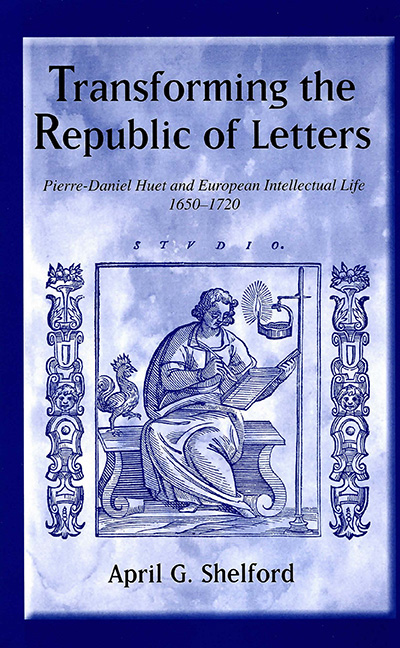Book contents
- Frontmatter
- Dedication
- Contents
- List of Illustrations
- Acknowledgments
- Introduction
- Chapter 1 The Road to Parnassus, 1648–61
- Chapter 2 The Lives of Poems, 1653–63
- Chapter 3 The Empire of Women, 1651–89
- Chapter 4 The Gate of Ivory, 1646–90
- Chapter 5 Defending Parnassus, 1666–92
- Conclusion A Dialogue with the Future
- Notes
- Selected Bibliography
- Index
Chapter 3 - The Empire of Women, 1651–89
Published online by Cambridge University Press: 11 May 2017
- Frontmatter
- Dedication
- Contents
- List of Illustrations
- Acknowledgments
- Introduction
- Chapter 1 The Road to Parnassus, 1648–61
- Chapter 2 The Lives of Poems, 1653–63
- Chapter 3 The Empire of Women, 1651–89
- Chapter 4 The Gate of Ivory, 1646–90
- Chapter 5 Defending Parnassus, 1666–92
- Conclusion A Dialogue with the Future
- Notes
- Selected Bibliography
- Index
Summary
Je veux que vous soiés ma Reine Mais je veux etre votre Roi.
—Huet, poem for Madame de CoulangesA Gendered Intellectual Geography
“When you set to work, you work for the learned; when you amuse yourself and relax, you work for us, and you do not disdain our sex.” With these words, the Marquise de Lambert thanked Huet for sharing his novel Diane de Castro and for giving her a copy of his treatise on novels. Huet composed Diane de Castro, ou le faux Inca when he was twenty-five, and decades passed before he permitted anyone to read it. The marquise probably composed her note early in the eighteenth century. Certainly, the letter struck a nostalgic tone. Believing that literary taste had declined, she looked back to Lafayette's works as “perfect models” of the genre. She praised Huet's novel for its inventiveness and for setting a good example. “As we have been banished, Monsieur, from the land of reason and learning, and have been left the empire of the imagination, we should at least dream nobly, and intelligence and feeling should have some part in our illusions.”
Here I want to extend the marquise's distinction of female and male learning to create an umbrella concept, “The Empire of Women,” that will cover the range of female intellectual endeavors discussed in this chapter. The phrase intentionally suggests a contrast with the Republic of Letters. Superficially, the two “states” possessed similar modes of communication and sociability, social bonds, and genres of intellectual expression. Conversation, correspondence, love, friendship, collaboration, and poetry were central social practices and intellectual activities in both the Empire of Women and Huet's Republic of Letters. Citizens of both worried about authenticity and transparency. Yet, as the terms “empire” and “republic” imply different principles of organization and interaction (hierarchical versus egalitarian), so the same words signal different social and intellectual realities that were frequently characterized in gendered terms. The two states engaged throughout the century in a running “debate between pedantry and honnêteté, between rules and freedom, between knowledge and taste.” Finally, by directing our steps toward the Empire of Women, we visit a place where cultural forces were massing to transform the Republic of Letters.
- Type
- Chapter
- Information
- Transforming the Republic of LettersPierre-Daniel Huet and European Intellectual Life, 1650–1720, pp. 77 - 113Publisher: Boydell & BrewerPrint publication year: 2007



